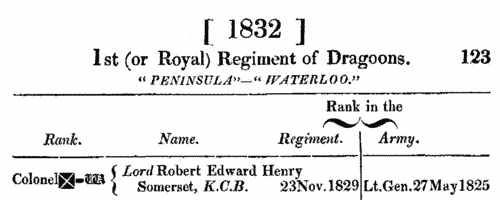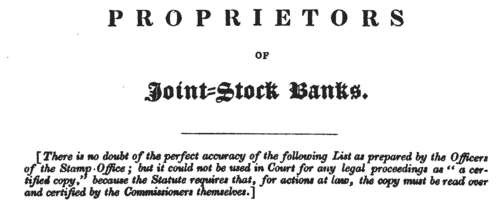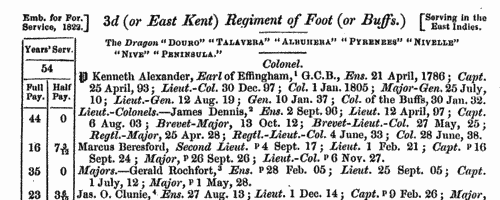Macandrew Surname Ancestry ResultsOur indexes 1000-1999 include entries for the spelling 'macandrew'. In the period you have requested, we have the following 62 records (displaying 1 to 10): Single Surname Subscription | | | Buying all 62 results of this search individually would cost £320.00. But you can have free access to all 62 records for a year, to view, to save and print, for £100. Save £220.00. More... |
These sample scans are from the original record. You will get scans of the full pages or articles where the surname you searched for has been found. Your web browser may prevent the sample windows from opening; in this case please change your browser settings to allow pop-up windows from this site. Scottish litigants, rebels and cautioners
(1585-1592)
The Privy Council of Scotland exercised a superior judicial authority in the kingdom, and consequently received and dealt with a constant stream of petitions, as well as dealing with the internal security of the state. This register of the council from 1 August 1585 to 31 July 1592, in the reign of king James VI, was edited by David Masson, and published under the direction of the Lord Clerk Register of Scotland in 1881. Some of the individuals mentioned are the complainants, those of whom they complained, and the sureties on both sides: at this period, some of the complainants are alleging serious attacks, often of a feuding nature. Many of the bonds entered into by the cautioners are promises to keep the peace towards such enemies. Failure to answer to the council when summoned was a serious contempt, leading to being denounced a rebel, with serious consequences. But 'horning' was also used in the pursuit of debts: there was no imprisonment for debt in Scotland, but a creditor could have an obstinate debtor ordered, in the sovereign's name, to pay what was due, failing which, the debtor could be put to the horn, denounced as a rebel, and imprisoned as a rebel. The main text (to page 774) is from the Acta Secreti Concilii, containing the minutes of the Privy Council, with intermixed Acta Proper (political edicts), Decreta (judicial decisions), Acta Cautionis (acts of caution) and Bands (registration of bonds). After that are printed some miscellaneous Privy Council documents from the same years: additional acts of caution (775-778); ordinances and acts anent the Borders and the North (779-814); and miscellaneous privy council papers (815-834). The sources most productive of names, the Acta Cautionis and Registration of Bands, are also the most repetitive in form, and are not transcribed verbatim and literatim: nevertheless, one of the editor's rules was for 'All proper names and names of places occurring in the originals to be preserved in the abstracts without exception, and in the exact original spelling.'
MACANDREW. Cost: £4.00.  | Sample scan, click to enlarge

| Scottish litigants, rebels and cautioners
(1592-1599)
The Privy Council of Scotland exercised a superior judicial authority in the kingdom, and consequently received and dealt with a constant stream of petitions, as well as dealing with the internal security of the state. This register of the council from August 1592 to May 1599, in the reign of king James VI, was edited by David Masson and published under the direction of the Deputy Clerk Register of Scotland in 1882. The publication brings together the contents of the principal register (Acta Secreti Concilii) with acts and bands (bonds) of caution (surety) from the registers called Acta Cautionis (pp 561-730); Acts and Ordinances relating to the Borders and the North (731-748); and Miscellaneous Privy Council Papers (749-769). Many of the individuals mentioned are the complainants, those of whom they complained, and the sureties on both sides: at this period, many of the complainants are alleging serious attacks, often of a feuding nature. Many of the bonds entered into by the cautioners are promises to keep the peace towards such enemies. Failure to answer to the council when summoned was a serious contempt, leading to being denounced a rebel, with serious consequences.
MACANDREW. Cost: £4.00.  | Sample scan, click to enlarge

| Scottish litigants, rebels and cautioners
(1610-1613)
The Privy Council of Scotland exercised a superior judicial authority in the kingdom, and consequently received and dealt with a constant stream of petitions, as well as dealing with the internal security of the state. This register of the council from July 1610 to February 1613, in the reign of king James VI, was edited by David Masson and published under the direction of the Deputy Clerk Register of Scotland in 1889. The publication starts with the Acta and Decreta, a chronological consolidation of material from Acta Secreti Concilii proper, the Decreta, the Book of Commissions, the Book of Sederunts, the Minute Book of Processes, and The Book of the Isles. There is then a section of Royal and Other Letters (pp. 565-644); then acts and bands (bonds) of caution (surety) from the registers called Acta Cautionis (pp. 647-690); and Miscellaneous Privy Council Papers (693-746). Many of the individuals mentioned are the complainants, those of whom they complained, and the sureties on both sides: at this period, many of the complainants are alleging serious attacks, often of a feuding nature. Many of the bonds entered into by the cautioners are promises to keep the peace towards such enemies. Failure to answer to the council when summoned was a serious contempt, leading to being denounced a rebel, with serious consequences.
MACANDREW. Cost: £4.00.  | Sample scan, click to enlarge

| Inhabitants of Rhode Island
(1678-1706)
Records of the colony of Rhode Island (Narragansett or King's Province) and Providence Plantations from August 1678 to October 1706 were edited by John Russell Bartlett, Secretary of State, and published by order of the General Assembly in 1858. The minutes of the general assembly have certain lacunae from those troubled times, in particular for the years 1687 to 1689 and 1691 to 1695. The text was supplemented with some material surviving in England in the Public Record Office. MACANDREW. Cost: £4.00.  | Sample scan, click to enlarge

|  Clerks and apprentices
(1779) Clerks and apprentices
(1779)
Apprenticeship indentures and clerks' articles were subject to a 6d or 12d per pound stamp duty: the registers of the payments usually give the master's trade, address, and occupation, and the apprentice's name, as well as details of the date and length of the apprenticeship. 2 January to 31 December 1779. IR 1/30MACANDREW. Cost: £8.00.  | Sample scan, click to enlarge

| Officers of the British Army
(1832)
The annual Army List, published By Authority, first lists officers of the rank of major and above, by rank, and with dates of appointment to each successive higher rank; holders of crosses, crosses with clasps (with number of clasps indicated), medals, medals with clasps (with number of clasps indicated) are marked as such; and an ornate W indicates those officers actually present in any of the actions of 16, 17 or 18 June 1815 and therefore awarded the Waterloo Medal. For each officer in this section, the final column notes his then present or immediately former regiment and/or office, if any. Next, all the officers of the army are listed, down to the rank of ensign, by regiment or corps, giving rank, name, date of rank in the regiment, and date of rank in the army, with occasional further notes. Again, holders of medals are duly noted, as in the first list. For each regiment the paymaster, adjutant, quartermaster, surgeon and assistant surgeons are named, as well as the civilian agent; and the regimental motto, battle honours, and colours of the facings and lace of the dress uniform are stated. After the British regiments of the line, the officers of the West India infantry, the Ceylon rifles, the Royal African Colonial Corps, the Cape Mounted Riflemen, the Royal Newfoundland Veterans, and the Royal Malta Fencibles are given; then the officers of the garrisons and other military establishments in Great Britain, Ireland, North America and Gibraltar (with Malta); the Royal Artillery; Commissariat Department; Medical Department; Chaplains' Department; officers retained on full pay; officers on British half pay; and officers on Foreign half pay (including the German Legion, the Brunswick Cavalry, the Brunswick Infantry, Chasseurs Brittaniques, Corsican Rangers, Dillon's Regiment, the Greek Light Infantry, Malta Regiment, Meuron's Regiment, Roll's Regiment, Sicilian Regiment, Watteville's Regiment, and the York Light Infantry Volunteers).MACANDREW. Cost: £4.00.  | Sample scan, click to enlarge

| British Guiana Slave Owners (1838)
Slavery was abolished throughout the British Empire by act of Parliament in 1833. This list, published in 1838, gives details of compensation paid to owners who had suffered by the emancipation of their slaves after abolition. The table gives the date of the award, the number of the claim, the full name of the party to whom payment was awarded, the number of slaves, and the sum paid. Some masters had owned more than 100 slaves; most of the claimants had only a few. The cost of the loss of a single slave was generally assessed here at as much as £63. There were 2668 claims from British Guiana, including some that were abandoned, disallowed, or still unsettled because of litigation.
MACANDREW. Cost: £8.00.  | Sample scan, click to enlarge

| Shareholders of the National Provincial Bank of England
(1838)
The provincial banks of England and Wales made annual returns to the Stamp Office of their proprietors or shareholders. These returns, registered in March 1838, from the 103 banks then in existence, contain the full names and addresses of nearly 30,000 shareholders. This bank had branches at Aberystwyth, Amlwch, Barnstaple, Bath, Bideford, Birmingham, Boston, Brecon, Bristol, Bury St Edmunds, Cardiff, Cheltenham, Darlington, Dolgelly, Dursley, Exeter, Gloucester, Hereford, Honiton, Ilfracombe, Ipswich, Kingsbridge, Leicester, Lichfield, Manchester, Plymouth, Pwllheli, Ramsgate, Rugby, Stockton, South Molton, Tiverton, Tamworth, Wisbech, Wem, Worcester, Wotton, Whitchurch (Salop) and Yarmouth (Norfolk).MACANDREW. Cost: £6.00.  | Sample scan, click to enlarge

| Officers of the British Army
(1840)
The New Annual Army List, corrected to 7 February 1840, was published in London by Lieut. H. G. Hart. It lists all serving officers, first of all a list of General and Field Officers by rank from field marshal down to major; and then by regiment, including all ranks down to ensign, with paymasters, adjutants, quarter-masters, surgeons and assistant-surgeons. These lists are all annotated with dates of rank in the army and regiment, and with symbols indicating the officers present at Trafalgar (T), in the Peninsula or the South of France (P), and Waterloo (W). A superscript p indicates that the commission was purchased; an asterisk that it was temporary. The regiments and units are listed in order of precedence: Head Quarters staff; Life Guards; Horse Guards; 7 regiments of Dragoon Guards; 17 regiments of Dragoons; 98 regiments of Foot; the Rifle Brigade; two West India regiments of Foot; Ceylon Rifles; Royal African Colonial Corps; Cape Mounted Rifles; Royal Newfoundland Veterans; Royal Malta Fencibles; Recruiting Staff; Royal Artillery; Royal Engineers; Royal Marines; Commissariat; and the Medical Department. MACANDREW. Cost: £4.00.  | Sample scan, click to enlarge

| Mariners' Church Donations
(1845)
Each monthly issue of The Mariners' Church Soldiers' and Sailors' Gospel Temperance Magazine, published by the Temperance British and Foreign Seamen's, Soldiers' and Steamers' Friend Society, and Bethel Flag Union, to promote religious instruction and temperance moral reformation and general unsectarian missions in the British Empire, at home and abroad, contained a section of Acknowledgments of sums contributed by individuals or through the Bethel churches to the society's funds, and in support of the orphan home. MACANDREW. Cost: £6.00.  | Sample scan, click to enlarge

|
Research your ancestry, family history, genealogy and one-name study by direct access to original records and archives indexed by surname.
|













